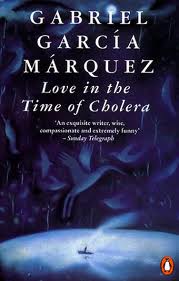Love in the Time of Cholera – Gabriel Garcia Marquez
I chose Love in the Time of Cholera to read next due to the recent death of Gabriel Garcia Marquez and the interesting news stories about his life and works. I have to say, I was quite disappointed with this one. I think I found the style and characters hard to relate to, though this changed towards the end.
The novel tells the story of Florentino Ariza and Fermina Daza. They fall in love young and keep this alive from a distance through passionate letters, hardly having the opportunity to meet. Even when Fermina Daza’s father finds out and tries to separate them by taking his daughter to stay with their uncle, Florentino Ariza manages to track her down and remain in contact. This continues for years until Fermina Daza returns, sees Florentino Ariza at the market and dismisses their relationship and planned marriage entirely.
She marries Doctor Urbino, although their marriage is not happy. Meanwhile, Florentino Ariza has many affairs with various women, with whom he finds passion but not love. The widow meets with him “in the hope of finding something that resembled love, but without the problems of love”. When the doctor dies they reunite and go on a cruise together. In order to prevent a scandal when people Fermina Daza knows try to board the ship, Florentino Ariza sends orders to the captain to not let anyone aboard due to a case of Cholera. But once the cholera flag is raised, no port will accept their ship and they are condemned to sail on forever.
The relationship between love and cholera is explicit throughout. In fact, Florentino’s lovesickness is at one point mistaken for cholera itself leading the doctor to conclude that “the symptoms of love were the same as those of cholera”. Hence love and suffering go hand in hand, with both physical and emotional impacts. There also seems to be a link between love and death; at the end, the final surrender to love is signalled by the yellow cholera flag. Their love also seems more real when they are old; at the beginning it is infatuation without substance, a “delirious spring”, but when they rekindle their relationship it seems to have more depth and tenderness. Florentino has written her a new letter; a reflection on life, “as lyrical as the others, as rhetorical as all of them”, but this one has “foundation in reality”. They find something at the end that seems to go “beyond love”, with the knowledge that “love was always love, anytime and anyplace, but it was more solid the closer it came to death”.
The shifts in time between past and present could be linked to the turn of the century setting, in which past, present and future are revaluated. At one point in the novel, during celebrations for the new century, Doctor Juvenal Urbino is asked his opinion and says that “the nineteenth century is passing for everyone except us” – this community is stagnant due to the epidemic, as love leads to the ship’s endless to and fro motion.

